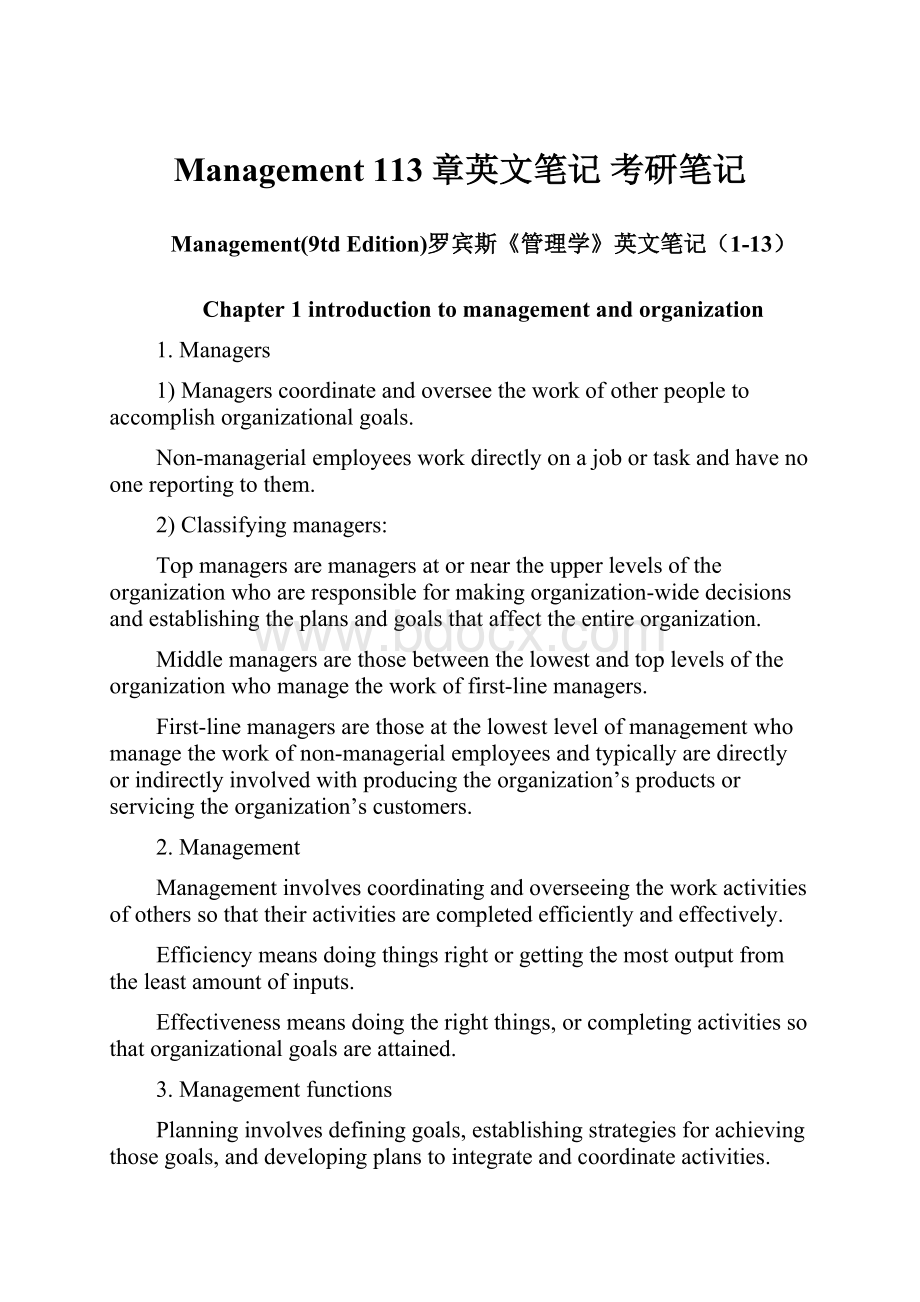Management 113章英文笔记 考研笔记.docx
《Management 113章英文笔记 考研笔记.docx》由会员分享,可在线阅读,更多相关《Management 113章英文笔记 考研笔记.docx(32页珍藏版)》请在冰豆网上搜索。

Management113章英文笔记考研笔记
Management(9tdEdition)罗宾斯《管理学》英文笔记(1-13)
Chapter1introductiontomanagementandorganization
1.Managers
1)Managerscoordinateandoverseetheworkofotherpeopletoaccomplishorganizationalgoals.
Non-managerialemployeesworkdirectlyonajobortaskandhavenoonereportingtothem.
2)Classifyingmanagers:
Topmanagersaremanagersatorneartheupperlevelsoftheorganizationwhoareresponsibleformakingorganization-widedecisionsandestablishingtheplansandgoalsthataffecttheentireorganization.
Middlemanagersarethosebetweenthelowestandtoplevelsoftheorganizationwhomanagetheworkoffirst-linemanagers.
First-linemanagersarethoseatthelowestlevelofmanagementwhomanagetheworkofnon-managerialemployeesandtypicallyaredirectlyorindirectlyinvolvedwithproducingtheorganization’sproductsorservicingtheorganization’scustomers.
2.Management
Managementinvolvescoordinatingandoverseeingtheworkactivitiesofotherssothattheiractivitiesarecompletedefficientlyandeffectively.
Efficiencymeansdoingthingsrightorgettingthemostoutputfromtheleastamountofinputs.
Effectivenessmeansdoingtherightthings,orcompletingactivitiessothatorganizationalgoalsareattained.
3.Managementfunctions
Planninginvolvesdefininggoals,establishingstrategiesforachievingthosegoals,anddevelopingplanstointegrateandcoordinateactivities.
Organizinginvolvesarrangeandstructureworktoaccomplishorganizationalgoals.
Leadinginvolvesworkingwithandthroughpeopletoaccomplishorganizationalgoals.
Controllinginvolvesmonitoring,comparing,andcorrectingworkperformance.
4.Managementroles(HenryMintzberg’smanagerialroles)
1)Interpersonalrolesinvolvepeopleandotherdutiesthatareceremonialandsymbolicinnature.
2)Informationrolesinvolvecollecting,receiving,anddisseminatinginformation.
3)Decisionalrolesinvolvemakingchoices.
Interpersonalroles
Figurehead
象征性首脑,履行许多法律性或社会性的义务
迎接来访者;签署法律文件
Leader
负责激励下属,承担人员配备、培训及有关职责
实际上从事所有的有下级参与的活动
Liaison
维护自行发展起来的外部关系和消息来源,从中得到帮助和信息
发感谢信;从事外部委员会的工作;从事其他有外部人员参加的活动
Informationroles
Monitor
寻求和获取各种内部外部信息以便透彻理解组织与环境
阅读期刊和报告;与有关人员保持私人接触
Disseminator
将从外部人员和下级处获得的信息传递给组织其他成员
举行信息交流会;打电话方式转达信息
Spokesperson
向外部发布组织的计划、政策、行动、结果等
召开董事会,向媒体发布信息
Decisionalroles
Entrepreneur
寻求组织和环境中的机会,制定改进方案以发起变革
组织战略制定和检查会议,以开发新项目
Disturbancehandler
当组织面临重大的意外的混乱时负责采取纠正行动
组织应对混乱和危机的战略制定和检查会议
Resourceallocator
负责分配组织各种资源,制定和批准相关决策
调度、授权、开展预算活动,安排下级工作
Negotiator
在主要的谈判中作为组织的代表
参加与工会的合同谈判
5.Managementskills(RobertL.Katz)
Technicalskillsarethejob-specificknowledgeandtechniquesneededtoproficientlyperformworktasks.
Theseskillsaremoreimportantforfirst-linemanagers.
Humanskillsrefertotheabilitytoworkwellwithotherpeoplebothindividuallyandinagroup.
Theseskillsareequallyimportantforallmanagers.
Conceptualskillsrefertotheabilitytothinkandtoconceptualizeaboutabstractandcomplexsituations.
Theseskillsaremoreimportantfortopmanagers.
6.Thechangesinmanager’sjob:
1)Changingtechnology(digitization)
Impact:
shiftingorganizationalboundaries
Virtualworkplaces
Moremobileworkforce
Flexibleworkarrangement
Empoweredemployees
2)Changingsecuritythreats
Impact:
riskarrangement
Worklife-personallifebalance
Restructuredworkplace
Discriminationconcerns
Globalizationconcerns
Employeeassistance
3)Increasedemphasisonorganizationalandmanagerialissues
Impact:
redefinedvalues
Rebuildingtrust
Increasedaccountability
4)Increasedcompetitiveness
Impact:
customerservice
(Customerserviceisimportantbecausewithoutthem,mostorganizationswouldceasetoexist.Andemployeeattitudesandbehaviorsplayabigroleincustomersatisfaction.)
Innovation
(Innovationisimportantfororganizationstobecompetitive.)
Globalization
Efficiency/productivity
7.Organization
Characteristicsoforganization:
adistinctivepurpose,composedofpeople,andadeliberatestructure.
Today’sorganizationsaremoreopen,flexible,andresponsivetochangesthanorganizationsoncewere.
Whystudymanagement
It’simportanttostudymanagementforthreereasons:
(1)theuniversalityofmanagement,
(2)therealityofwork,and(3)therewardsandchallengesofbeingamanager.
(1)Theuniversalityofmanagementreferstothefactthatmanagersareneededinalltypesandsizesoforganizations,atallorganizationallevelsandworkareas,andinallgloballocations.
(2)Therealityofwork—thatisyouwilleithermanageorbemanaged.
(3)Rewards:
Createaworkenvironmentinwhichorganizationalmemberscanworktothebestoftheirability.
Haveopportunitiestothinkcreativelyanduseimagination.
Helpothersfindmeaningandfulfillmentinwok.
Support,coach,andnurtureothers,etc.
Challenges:
Dohardwork
Mayhavemoreclericalthanmanagerialduties
Havetodealwithavarietyofpersonalities
Oftenhavetomakedowithlimitedresources,etc.
Chapter7FoundationsofPlanning
1.Planning
Planninginvolvesdefiningorganization’sgoals,establishinganoverallstrategyforachievingthosegoals,anddevelopingplanstointegrateandcoordinateworkactivities.
Informalplanning,specificgoalscoveringaspecifictimeperiodarewrittenandsharedwithorganizationalmembers,andspecificplansexistforachievingthesegoals.
Ininformalplanning,goalsareneverwrittendownorseldomtalkedwithotherorganizationalmembers.Informalplanningalsolackscontinuity.
2.Thepurposeofplanning
1)Providingdirectiontomanagersandnon-managersalike.
2)Reducinguncertainty.
3)Minimizingwasteandredundancy.
4)Establishinggoalsorstandardsusedincontrolling.
3.Therelationshipbetweenplanningandperformance
First,generallyspeaking,formalplanningisassociatedwithpositivefinancialresults.
Second,it’smoreimportanttodoagoodjobofplanningandimplementingtheplansthantodomoreextensiveplans.
Next,instudieswhereformalplanningdidn’tleadtohigherperformance,externalenvironmentoftenwastheculprit.
Finally,theplanning-performancerelationshipseemstobeinfluencedbytheplanningtimeframe.
4.Goals:
Goalsaredesiredoutcomes.
Thetypesofgoals:
financialgoalsarerelatedtothefinancialperformanceoftheorganization,whilestrategicgoalsarerelatedtoallareasofanorganizationperformance.
Statedgoalsareofficialstatementofwhatanorganizationsays—andwhatitwantsitsvariousstakeholderstobelieve–itsgoalsare.Realgoalsarethegoalsthatanorganizationactuallypursues,anddefinedbytheactionsofitsmembers.
5.Plans:
Plansaredocumentsthatoutlinehowgoalsaregoingtobemet.
Typesofplans:
(breadth)strategicoroperational
(Timeframe)longtermorshortterm
(Specificity)directionalorspecific
(Frequencyofuse)singleuseorstanding
Strategicplansapplytoanentireorganization,whileoperationalplansencompassaparticularfunctionalarea.
Longtermplansarethosewithatimeframebeyondthreeyears.Shorttermplansarethosecovingoneyearorless.
Specificplansarecleardefinedandleavenoroomforinterpretation.Directionalplansareflexibleandsetoutgeneralguidelines.
Asingle-useplanisaone-timeplananddesignedtomeettheneedsofauniquesituation.Standingplansareongoingplansthatprovideguidanceforactivitiesperformrepeatedly.
6.Twoapproachestosettinggoals
Traditionalgoalsetting
Intraditionalgoalsetting,goalssetbytopmanagerflowdownthroughtheorganizationandbecomesubgoalsforeachorganizationarea.
Means-endschainisanintegratednetworkofgoalsinwhichgoalsachievedatlowerlevelsserveasthemeansforachievingthegoalsatthenextlevel.
Managementbyobjectives(MBO)
Managementbyobjectivesisaprocessofsettingmutuallyagreedupongoalsandusingthosegoalstoevaluateemployeeperformance.
7.Sixcharacteristicsofwell-writtengoals:
(1)writtenintermsofoutcomes,
(2)measurableandquantifiable,(3)clearastoatimeframe,(4)challengingbutattainable,(5)writtendown,(6)communicatedtoallorganizationalmemberswhoneedtoknowthem.
8.Fivestepsofsettinggoals:
1)Reviewtheorganization’smission
2)Evaluateavailableresources
3)Determiningthegoalsindividuallyorwithinputfromothers
4)Writedownthegoalsandcommunicatethemtoallwhoneedtoknowthem
5)Reviewresultsandwhethergoalsarebeingmet.
9.Threecontingencyfactorsinplanning:
themanager’slevelintheorganization,degreeofenvironmentuncertainty,andthelengthoffuturecommitments.
10.Twoapproachestoplanning
Traditionalapproach
Intraditionalapproach,plansaredevelopedbytopmanagersandflowdownthroughotherorganizationlevels;thisapproachmayuseaformalplanningdepartment.
MBO
MBOapproachinvolvesmoreorganizationalmembersintheplanningprocess.
11.Criticismsofplanning:
1)Planningmaycreaterigidity.
2)Planscan’tbedevelopedforadynamicenvironment.
3)Formalplanscan’treplaceintuitionandcreativity.
4)Planningmayfocusmanagers’attentionontoday’scompetition,notontomorrow’ssurvival.
5)Formalplansreinforcesuccess,whichmayleadtofailure.
6)Justplanningisn'tenough.
Thesecriticismsarevalidifplanningisrigidandinflexible.
12.Effectiveplanningintoday’sdynamicenvironment
Managersshoulddevelopplansthatarespecificbutflexible.
It’salsoimportanttomaketheorganizationalhierarchyflatterandallowlowerorganizationallevelstosetgoalsanddevelopplans.
Chapter8StrategicManagement
1.Definestrategicmanagement,strategy,andbusinessmodel.
Strategicmanagementiswhatmanagersdotodevelopan